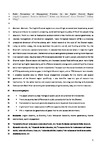Public perceptions of management priorities for the English Channel region
| dc.contributor.author | Carpenter, A | |
| dc.contributor.author | Shellock, R | |
| dc.contributor.author | von Haartman, R | |
| dc.contributor.author | Fletcher, S | |
| dc.contributor.author | Glegg, Gillian | |
| dc.date.accessioned | 2018-10-23T12:14:19Z | |
| dc.date.issued | 2018-11 | |
| dc.identifier.issn | 0308-597X | |
| dc.identifier.issn | 1872-9460 | |
| dc.identifier.uri | http://hdl.handle.net/10026.1/12592 | |
| dc.description.abstract |
The English Channel region is an area of high conservational importance, as well being a contributor to economic prosperity, social well-being and quality of life of the people living around it. There is a need to incorporate societal elements into marine and coastal governance, to improve management of the Channel ecosystem. Public Perception Research (PPR) is a relatively unexplored dimension of marine science, with limited research at the scale of the Channel region. Using an online survey, this study examined the public's use of, and funding priorities for, the Channel's marine and coastal environment. It revealed that there are variations in how the English and French coastlines are used. Environmental issues were generally viewed as being more important than economic ones. Country-level differences were observed for public uses of, and priorities for the Channel region. Cleaner water and beaches, and improved coastal flood defences, were more highly prioritised by English respondents, while offshore renewable energy and sustainability of businesses were more highly prioritised by French respondents. The paper contributes to the debate on the value of PPR by addressing evidence gaps in the English Channel region, and to PPR literature more broadly. It provides baseline data to inform future engagement strategies for the marine and coastal governance of the Channel region specifically. It also identifies how this type of research has implications for the wider marine and coastal environment, including contributing to Sustainable Development Goal 14 on conserving and sustainably using the oceans, seas, and marine resources. | |
| dc.format.extent | 294-304 | |
| dc.language | en | |
| dc.language.iso | en | |
| dc.publisher | Elsevier | |
| dc.subject | English Channel | |
| dc.subject | Le Manche | |
| dc.subject | Public Perception Research | |
| dc.subject | Marine governance | |
| dc.subject | Marine environment | |
| dc.subject | Public engagement | |
| dc.title | Public perceptions of management priorities for the English Channel region | |
| dc.type | journal-article | |
| dc.type | Journal Article | |
| plymouth.author-url | https://www.webofscience.com/api/gateway?GWVersion=2&SrcApp=PARTNER_APP&SrcAuth=LinksAMR&KeyUT=WOS:000448099300037&DestLinkType=FullRecord&DestApp=ALL_WOS&UsrCustomerID=11bb513d99f797142bcfeffcc58ea008 | |
| plymouth.volume | 97 | |
| plymouth.publication-status | Published | |
| plymouth.journal | Marine Policy | |
| dc.identifier.doi | 10.1016/j.marpol.2018.07.001 | |
| plymouth.organisational-group | /Plymouth | |
| plymouth.organisational-group | /Plymouth/Faculty of Science and Engineering | |
| plymouth.organisational-group | /Plymouth/Faculty of Science and Engineering/School of Biological and Marine Sciences | |
| plymouth.organisational-group | /Plymouth/REF 2021 Researchers by UoA | |
| plymouth.organisational-group | /Plymouth/REF 2021 Researchers by UoA/UoA14 Geography and Environmental Studies | |
| plymouth.organisational-group | /Plymouth/Research Groups | |
| plymouth.organisational-group | /Plymouth/Research Groups/Marine Institute | |
| plymouth.organisational-group | /Plymouth/Users by role | |
| plymouth.organisational-group | /Plymouth/Users by role/Academics | |
| dcterms.dateAccepted | 2018-07-01 | |
| dc.rights.embargodate | 2020-1-10 | |
| dc.identifier.eissn | 1872-9460 | |
| dc.rights.embargoperiod | Not known | |
| rioxxterms.versionofrecord | 10.1016/j.marpol.2018.07.001 | |
| rioxxterms.licenseref.uri | http://www.rioxx.net/licenses/all-rights-reserved | |
| rioxxterms.licenseref.startdate | 2018-11 | |
| rioxxterms.type | Journal Article/Review |


